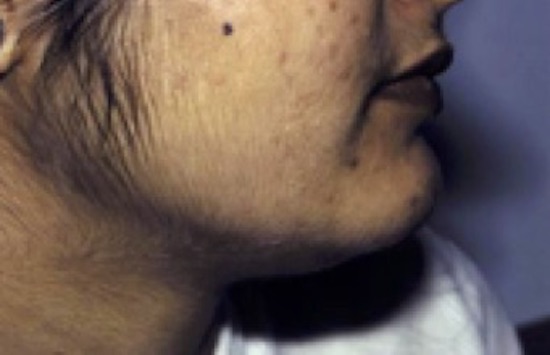Excess unwanted hair in women and girls in face or other parts of the body is called hirsutism. There is no fixed amount of hair that is needed for diagnosis; it is the sensitivity of the individual. If you think you are not happy with the facial or body hair, then it is excess and is called hirsutism.

Why does it happen?
This is mainly because of a problem in the balance of Androgen and Oestrogen, which are hormones. Hormones are chemical substances secreted by special glands in the body and taken to different areas by blood for their actions.
Both men and women will have androgen (male hormone) and oestrogen(female hormone); in men, androgen is high while the opposite is the case of women.
For some reason or the other, if this balance gets disturbed in women in favour of androgen, excess facial hair can develop. Also, some women are more sensitive to androgen, so you may have excess hair with a normal androgen level in the blood.
Where from the androgen comes?
Androgen is a natural steroid hormone in the body and is synthesized in two organs, i.e., Adrenal glands and gonads (ovaries in women and testes in men).
No other organ in the body can produce this. So if you have a high level of androgen in the blood you must have some problem, whatever it is, with your adrenals or ovaries.
What are the other features?
Excess androgen can cause a few symptoms in women. Other than excess facial hair it can cause weight gain, irregular period, excessive spots in the face and in extreme cases it can affect ovulation (fertility).
A very high level (usually from an androgen-secreting tumour of the ovary or adrenal gland) can produce a low-pitched voice (normally voice is high pitched in women and low pitched in men).
Was it my mistake that I have excess hair?
Certainly not, you have not done anything wrong. Commonest cause of excess androgen in our clinical practice is small cysts in the ovaries called Polycystic Ovary, where walls of the cysts secrete excess androgen.
There are different theories for developing cysts in the ovaries, there is a genetic component but nothing that you have done.
Regular exercise and not getting overweight helps if you already have cysts in the ovaries. Other causes are milder forms of adrenal glands defects, adrenal and ovarian tumours secreting androgen.
What investigations are needed?
After the clinical evaluation, we need to do simple tests first to see where the abnormalities are. Remember hormonal tests are costly, so should be done with proper care.
Hormonal values depend not only on the time of the day but also the time of the cycle. A random sample not only can be wastage of money but also may not give us the information we want.
A scan of the ovaries is helpful to see cysts. Adrenal glands are not seen well by ultrasound scan as they lie at the back of the tummy. So, when we want to see the adrenal gland, we prefer doing a CT scan. What treatments are available?
Excess hair: We have different antiandrogen preparations available, most of the time we combine them with oestrogen. They take time to work, miracles are not possible. Most people find good improvement. You can combine local treatment like threading, plucking, laser etc with our treatment; in this way response is more visible.
Irregular periods: cyclical combination of oestrogen and antiandrogen is good for regularising periods. Loosing weight is also helpful to get regular periods back.
Weight gain: This needs particular attention, it is often very easy to give a lecture about losing weight but practically most of the time it is very difficult. We are using now some tablets for losing weight, mainly in younger people.
Also, we use a tablet called Metformin for correcting the hormonal imbalance. This tablet is also used for Diabetes, but the beauty of the tablet is that it helps high sugar to come down to normal but it does not lower normal sugar to low sugar. So this is safe even when your blood sugar is normal.
Problem with conception: This can be there in some cases, but we now have a lot of medicines available for helping ovulation. Also people without cysts in the ovaries can have problems with conception.
Should I remove my hair?
Yes you can, when you want. You are the most important person to decide when to remove your excess hair. There are several ways to remove them, like waxing, threading, shaving, laser treatment etc.
This is a common belief that shaving makes hair grow sooner, there is no scientific proof or evidence for this. Actually, in severe cases we do recommend shaving. The best person to discuss the method of removing excess hair is your Dermatologist.
What are the long-term consequences?
It depends on the diagnosis. As you will know, by now, Polycystic Ovaries (PCO) is the commonest cause. Recently we know from various medical researches that the chance of diabetes is more if you have PCO. Studies are not done actually with a huge number of patients yet, so we do not see any reason for you get panicky.
Can my baby get this?
Very rarely, there is a chance that members of some families are more sensitive to androgens. In one of the conditions that can give rise to excess hair, i.e., Congenital Adrenal Hyperplasia (CAH), there is a genetic link, particularly if there is a consanguineous marriage.
Whom should I see for this problem?
People with this problem usually see a Gynaecologists first when periods are irregular and Dermatologist when facial hair is the main problem. Who you see is less important, correct information and explanation you should get.
At some point, I would suggest seeing Endocrinologist find out hormonal disturbance if any. In case it is there, hormonal treatment along with local treatment for excess facial hair works best.
Also see,